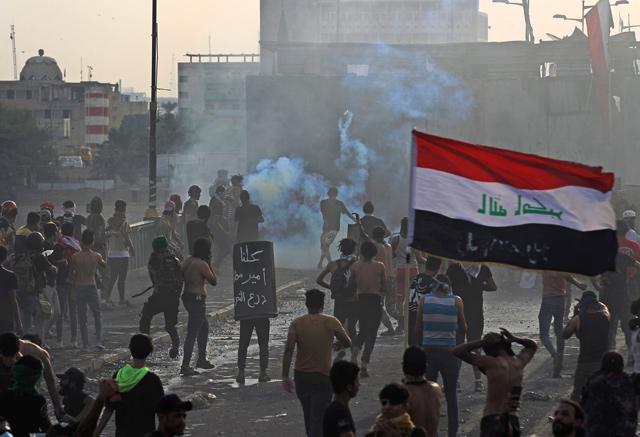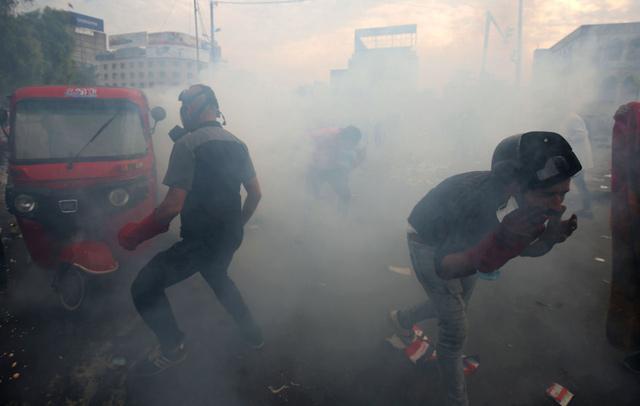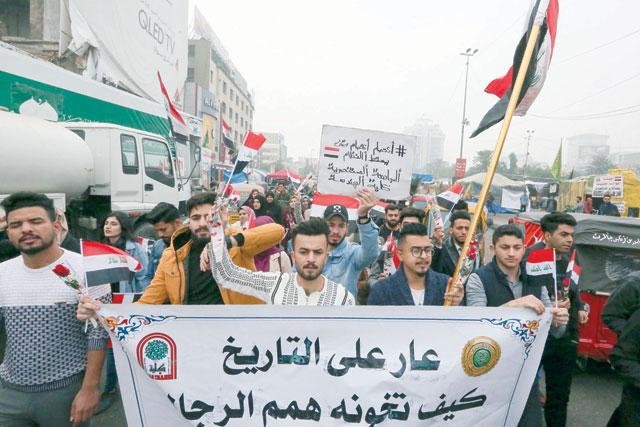You are here
Iraq protesters revive year-old revolt against the system
By AFP - Oct 26,2020 - Last updated at Oct 26,2020

Iraqi protesters run from tear gas fired by security forces amid clashes following a demonstration on Al Jumhuriya Bridge in the capital Baghdad on Sunday (AFP photo)
BAGHDAD — Iraqi security forces and protesters clashed in Baghdad on Sunday during demonstrations to mark the first anniversary of mass anti-government protests demanding the ouster of the ruling class.
Thousands took to the streets in Baghdad, some waving portraits of fallen "martyrs" killed in protests last year, with peaceful demonstrations also taking place in several cities in the south including Basra, Najaf and Nasiriyah.
In the capital, protesters hurled rocks as police fired tear gas canisters and used water cannons to block demonstrators from bridges leading to the highly-fortified Green Zone, a no-go zone for ordinary Iraqis where government offices, parliament and the US embassy are based.
Some demonstrators managed to scale a towering security barricade erected on Al Jumhuriyah Bridge across the Tigris River, but were then stopped by concrete walls and security forces, an AFP journalist reported.
Some protesters threw Molotov cocktails, the reporter added.
About 50 police and protesters were slightly injured, police and medical sources told AFP.
Sunday's demonstrations renewed the cross-sectarian, youth-led protest movement's key demand for the ouster of the entire ruling class accused of corruption, and of being beholden to neighbouring Iran.
"It's been a year and we still want our country back," said Batool Hussein, a woman demonstrator in central Baghdad's Tahrir Square, heart of the protests.
"We still want to unseat the corrupt from power, and we still want to know who killed the protesters last year."
About 600 protesters have been killed and 30,000 wounded in clashes with security forces nationwide since protests erupted in October 2019.
Activists have long complained of a campaign of kidnappings and killings to intimidate them into halting demonstrations.
The movement eventually lost momentum as tensions between Baghdad's key allies Tehran and Washington spiralled, then ground to a halt due to the coronavirus pandemic.
Hussein Mortada, from Amara in the south, said he was determined to take part in the revival of the so-called “October Revolution”, despite “threats from political parties and powerful local figures”.
‘Shake up thrones’
The burgeoning protests helped usher in Prime Minister Mustafa Al Kadhemi in May, but he has yet to deliver on any major reforms.
According to a World Bank report, one in three young people is unemployed in Iraq, OPEC’s second-biggest oil producer.
Uday Jaberi, an activist in the southern city of Nasiriyah, sent an angry message to politicians.
“These young people didn’t come out for nothing; they came to shake up the thrones you’ve been sitting on, you corrupt people!” he said.
“Young people who have been wounded and their families lost loved ones all for Iraq,” he added.
Lawyer and activist Sajjad Salam, from the southern city of Kut, had a list of demands.
“We want to dissolve parliament, a transparent electoral law, a new law organising political parties and for the state to take control of the flow of arms,” Salam said.
‘Respect the uniform’
On Saturday, Kadhemi gave a flat, technocratic speech, striking a tempered tone between appeasing protesters and warning against an escalation.
The prime minister, who also holds the post of intelligence chief, repeatedly urged security forces not to fire at demonstrators, but also called on protesters to “respect the uniform”.
In his address to the nation, Kadhemi said parliamentary elections now scheduled for June 2021, brought forward partly in response to protesters’ demands, would go ahead.
Iraq’s parliament is stacked with pro-Iran blocs resistant to tangible political reforms, as debate on a new electoral law is held up.
Armed pro-Iran factions have accused protesters of being “agents” of the US “occupier”.
Tensions have been high since January when a US drone strike near Baghdad airport killed top Iranian General Qassem Soleimani and an Iraqi lieutenant, Abu Mahdi Al Muhandis.
About 90 rockets have since targeted the US presence in Iraq, with several claimed by pro-Iran armed groups.
Related Articles
BAGHDAD — Back in October 2019, unprecedented protests demanded the fall of Iraq's ruling class.
BAGHDAD — Some 2,000 supporters of Iraq's pro-Iran Hashed Al Shaabi network protested on Friday in Baghdad against alleged fraud at last mon
BAGHDAD — A supporter of Iraqi anti-government demonstrators was gunned down in Baghdad, a police source said Sunday, the fourth backer of t














